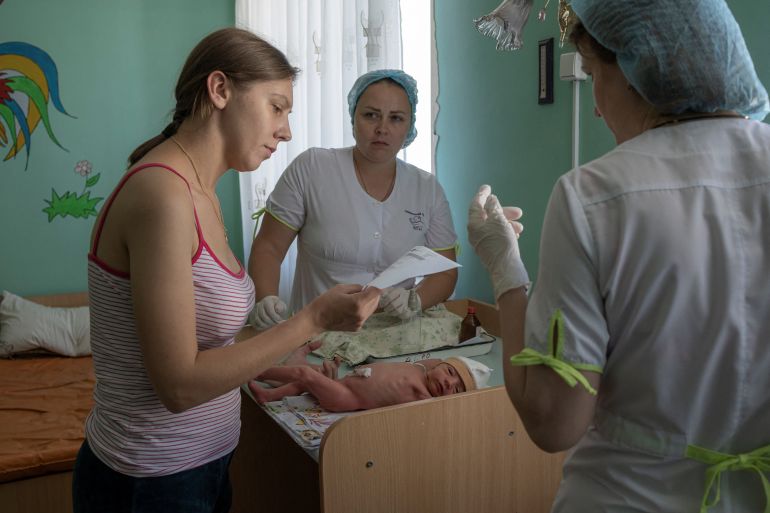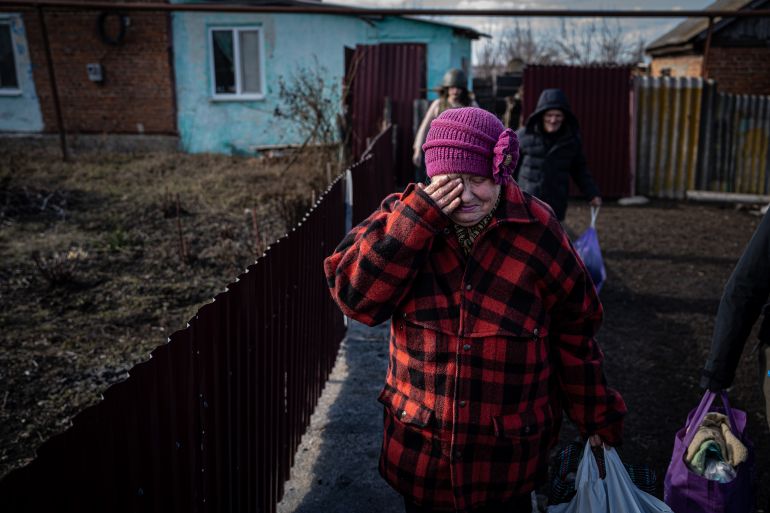As war rages, health services for women are perilous and they are particularly vulnerable to trafficking, domestic abuse, and gender-based and sexual violence.
As Russia’s bloody war in Ukraine continues to devastate lives across the country, women in particular are suffering detrimental effects to their mental, physical and sexual and reproductive health.
Millions of women remain displaced, making them extremely vulnerable to trafficking as well as gender-based and sexual violence.
The International Rescue Committee warned last month that abuse against women was rising.
Some expectant mothers give birth without medical assistance in basements and bomb shelters while hospitals are attacked, and basic services have been disrupted to such an extent that the reproductive health of many is in jeopardy.
We spoke to the Ukraine representative for the United Nations Population Fund (UNFPA), Jaime Nadal, about the continuing risk the conflict poses for women.
In 2022, almost 180,000 women gave birth in Ukraine, many suffering a risk to their lives because of difficulties accessing appropriate healthcare.
Hospitals and civilian infrastructure have been targeted with shelling. A pregnant woman [should] not be wandering around in the middle of shelling to access facilities.
The supply chain for items needed for C-sections and the management of birth and pregnancy complications is also impacted. In the most extreme cases, healthcare professionals have been forced to live in the hospitals they work in, adding significant stress.
We are seeing an increasing number of preterm babies and miscarriages, as well as conditions like eclampsia and hypertension. The nutrition of women is also being compromised by months of displacement and physical exhaustion.

In the first week of the full-scale war, 84 women gave birth in the Kyiv metro. When women give birth while sheltering from missile attacks underground in metro stations or in basements, they can develop life-threatening conditions such as sepsis that pose a great risk to them and their baby.
Any attack on civilian infrastructure, including a hospital, is a human rights violation and should never happen. These attacks undermine civilian access to life-saving services.
Many women are hesitant to go to hospitals and in the middle of shelling, it can be extremely risky to attempt to. At the beginning of the war in Chernihiv, to the north of Kyiv, a number of women went to hospitals to give birth and found they couldn’t go home again as Russia had occupied their villages.
One woman went to a hospital with her husband to give birth, leaving her other children with their grandparents. Russia occupied her home and she was unable to see or speak to her children for a month. You can imagine the level of anxiety and stress that causes.
There has been a rise in sexual and gender-based violence in Ukraine since the start of the war, as well as an increase in domestic violence.
The invasion displaced millions of people, many of them women and children. When you have so many people at that level of vulnerability, the risk of gender-based violence, sexual violence, trafficking and exploitation is high.
Our priority was to quickly re-establish services such as shelters and mobile clinics, and to make sure women know they can access psychosocial support and hygiene kits to preserve their dignity.
We first started seeing cases of sexual violence after the liberation of Bucha and Irpin. None of the survivors had reported the cases to law enforcement, and most wanted help to test for STIs [sexually transmitted infections] or pregnancy.

This is a very complex issue surrounded in stigma. Sometimes women don’t even identify themselves as having been assaulted. Some women have been forced into sex acts to cross a checkpoint, for example.
It takes a lot of work from psychologists to get them to open up and identify as survivors, and the trauma will take a long time to heal.
Before the war, we developed an initiative that provides space for men in the Ukrainian military to engage meaningfully with their children and wives. The first hubs were in the east from 2014. We provide men with psychosocial support that steers them away from toxic masculinity. This helps them process trauma, which can manifest in violence, abuse or alcohol misuse.
It’s hard to rely on numbers, as they don’t give an accurate reflection of the problem. Many survivors are reluctant to disclose what happened due to trauma, stigma and self-blame.
Out of the cases recorded by OHCHR, the UN High Commissioner for Human Rights, two-thirds are women and one-third are men, many of them former prisoners of war. The number of cases reported is probably the tip of the iceberg.
In our Dnipro centre, staff told me that for every 100 women they have seen, maybe 10 have suffered gender-based violence and one sexual violence. Sometimes people try to pretend it didn’t happen or try to live with it and don’t seek help.
We need to ensure that survivors know they are not alone, the situation matters and that the UN and the Ukrainian government are working to provide them with the best care possible. Our mobile teams have provided general support to over 17,000 women so far, and our relief centres almost 10,000. The more services we put in place the more survivors will seek help.
We’re very worried about the protracted nature of this crisis now. There has been a huge movement of women from the east and south to central and western Ukraine and abroad.
The harsh conditions of displacement increase the complexity of women’s needs.
The lack of available work and income poses a huge challenge to the wellbeing of women and their families, as well as the difficulty in accessing healthcare in some places. What we’re seeing is that the situation is worse in 2023 and we are constantly trying to keep up with new developments.
We have repeatedly requested access to occupied territories, but have not been granted it. In the east of the country, we’re very concerned about the situation of older women. Some don’t want to leave their homes behind and are living close to the front line of the conflict with serious health conditions, such as uterine prolapse.
There are some mobile clinics run by the government that we support that go to communities to help, especially for those with mobility issues or disability, and for areas where there is no public transport.
War comes with suffering, pain, stress and anxiety. The extension of this war is prolonging the distress of millions of women.



No comments:
Post a Comment
Note: only a member of this blog may post a comment.